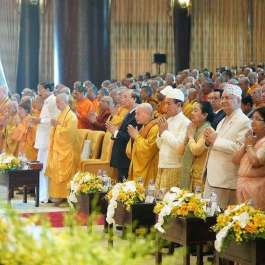
Lingyen Mountain Temple in Richmond, British Columbia, a city in the metro area of Vancouver, is organizing a refuge-taking ceremony for pets on 11 May. The practice began after the COVID-19 pandemic to extend the opportunity for refuge to non-human animals.
Explaining that the practice is akin to baptism, Master Shiu Fong highlighted that the ceremony was the initial step for individuals embracing Buddhism: “Lots of families, they have their pets. . . . So they also want their animals [to] be blessed,” Master Shiu Fong added that all sentient beings, be they humans or animals, were believed to possess buddha-nature. (Richmond News)
The temple previously conducted refuge-taking ceremonies for humans five to six times a year. However, in response to the pandemic, they have extended the practice to include pets. All sorts of pets—from dogs and cats to rabbits, birds, and insects, as long as they are in a safe cage or other enclosure—are welcome to take part.
During the ceremony, which takes place at the temple’s Eightfold Path Garden and can be attended online, Buddhist masters perform rituals involving singing, ground purification, and prayer. It is believed that by participating, pets establish a connection with the Buddha.
Master Shiu Fong noted that the ritual had observable benefits for pets, often leading to improved behavior. “Sometimes after [the pets] take refuge, even if they don’t understand what we do in the ritual . . . they become more well-behaved,” she stated. (Richmond News)

Lingyen Mountain Temple was founded in 1999 by Venerable Master Miao Lien. Ven. Master Miao Lien was born in China in 1922 and became a monk at Baohua Mountain Temple in Nanjing before moving to Lingyen Mountain Temple in Suzhou. He later spent time on Lantau Island in Hong Kong and in Taiwan, where he initiated the building of Taiwan Lingyen Mountain Temple in 1986.
Many Buddhist traditions have undertaken the practice of offering refuge and other blessings to pets. Tania Duratovic and Phil Hunt, writing for the the Tibetan organization Foundation for the Preservation of the Mahayana Tradition (FPMT), notes that:
While Buddhists believe the karmic benefit of doing these practices will be ongoing and perhaps have a greater effect in future lives, the welfare of the animals in this life is also critical. Animals should be handled and cared for as the “kind mother sentient beings” we are taught that they are, and as the fragile living creatures that share our planet and suffer physically, mentally and emotionally.
(FPMT)
In Japan’s Pure Land Buddhist traditions, the possibility of animals reaching the Pure Land has become a topic of intense debate. Historically, it was believed that animals could only attain the Pure Land after a rebirth as a human, where practices could be undertaken to assure such a future rebirth. However, Hayashida Kojun of Taisho University, argued recently that this interpretation was mistaken: “Honen also taught that animals can achieve rebirth in the Pure Land through transfer of merit.” (Nippon) He reasoned that humans could transfer enough merit to animals to ensure a rebirth directly into the Pure Land.

Pet owners interested in registering for the ceremony at Lingyen Mountain Temple can find more information on the temple’s event page.
See more
All pets welcome at Richmond Buddhist blessing ceremony (Richmond News)
Considerations for Animal Blessings and Animal Liberations (FPMT)
Can Dogs Be Reborn in Paradise? Japan’s Buddhist Funerals for Pets (Nippon)
Related news reports from BDG
Thai New Year Holiday Prompts Renewed Appeal to Stop Buddhist Life-Release Practice
Buddhist Monk in China Saves Thousands of Abandoned Animals
Myanmar Animal Shelter Uses Buddhist Chants to Soothe Stray Dogs
174 White Foxes Rescued from Fur Farm and Rehoused at Buddhist Monastery in China
Buddhist Pagoda in Myanmar Offers Refuge to Snakes
Bhutan, WWF Launch US$43m Conservation Program for Protected Ecosystems
Vegetarian Farmer Saves Beef Cattle from the Slaughterhouse
New Wildlife Reserve Could Help Save China’s Big Cats
Related features from BDG
On Loving and Losing Our Pets
All Sentient Beings
Our Pets, Our Teachers
Engaging the Six Paramitas to Care for Animals, Part Two: Diligence, Concentration, and Wisdom
Engaging the Six Paramitas to Care for Animals, Part One: Generosity, Discipline, and Patience
Committed to the End – Caring for Sick and Elderly Pets
Childhood Pets, Animals, and Kindness












